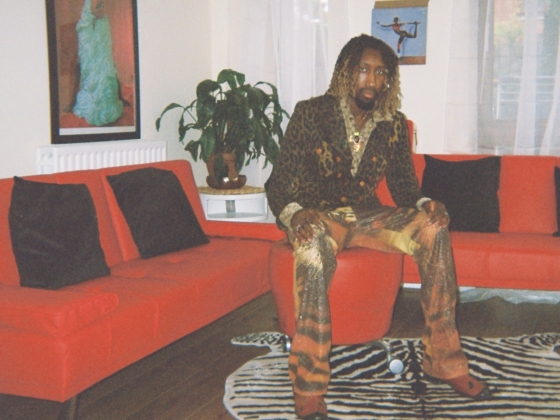The first thing I notice when I listen to music by Mereba is her fearlessness; her courage to tackle and blend nearly every genre in music, the boldness in which she speaks without regret, but most of all, her ability to take listeners into her world with just the flick of her tongue. Mereba builds on all of these traits in her major-label debut (Interscope Records) and most ambitious effort to date: The Jungle Is The Only Way Out. The album tells the story of an all too familiar plight: a long, drawn-out breakup. Don't get it twisted though, this isn't your standard breakup album featuring Alanis Morissette.
The Jungle Is The Only Way Out opens its world to us with a spoken-word rendition "more", loosely setting the scene for the album. Apart from the sparse vocals that almost appear as ghosts in the backdrop, the track is slow, and soft spoken, touching on personal growth to begin—write more and freedom fight more—before flipping to the impact of musical growth on her life.
The somber nature of the intro track drifts into "Kinfolk" before being replaced with guitars that feel like they were taken straight out of a Dodge Ram commercial. "Kinfolk" is the embodiment of a song shared around a campfire the morning after a long night. Mistakes have been made, the past is the past, it's time to move on. Mereba stands resolute that change is imminent with the statement, "Like a train not gon' save my love for no rainy day. I'll never find no peace that way," while powerful guitars line the high notes of her voice.
At this point, the expectation is that once someone finds their voice in a breakup it's over. First of all, that would be a very short album. And secondly, as we all know too well, this is never the case. The album goes on to confront all sorts of challenges and emotions while Mereba's voice caresses production from across a world of genres.
When she finds the next lane on "Highway 10" the vibe is completely different. The tones are much lighter, with bubbling keys flowing over the familiar but diluted guitar plucks that introduced the album. The song almost plays like an ode to the saying, "It's my way or the highway." The ultimatum is no longer there, she's chosen the highway and leaving things in the rear-view mirror.
She takes control of her new life on the highway in her statement piece, "Black Truck." The extended cut included on the album features bars that weren't on the original release from a year ago. With crisp delivery, Mereba punctuates her stance on still being called by her pet name, staying true, and cutting people off like old split ends. Her delivery of these sharp lyrics combines the strengths of her spoken word with her clever writing skills.
After another spoken-word track that touches on vices, Mereba welcomes her first featuring artist to the album, 6lack. Mereba has taken to Twitter to shed some light on this song, stating it was produced years ago at a different time in her life. And you can tell. This thing is filled with heat and sexy strings. Deep-hitting 808s accentuate 6lack's raspy flow while speaking on less personal issues and more social commentary. Despite feeling slightly dated, the track adds a nice bit of variety to the album, both in terms of production and lyrics.
The introduction of featuring guests also heavily benefited the overall sound of the album. Don't get me wrong, Mereba knows how to cover her bases, but by inserting featuring guests she introduces new elements to the album and takes it to new heights.
"Sandstorm" is the only other instance where the album makes use of featuring guests. The intimate affair gives the relationship a second face, with JID playing the part of devil's advocate. They do this all over lush strings and heavenly piano chords to give the album one of its more memorable moments. The song serves as an excellent reminder to the complicated string of emotions that accompany a breakup. The delivery and production sound cucumber cool, but listen to the lyrics and they tell a completely different story. It's the beautiful use of contrasting elements that make this song so powerful.
Just before "Sandstorm" however, the album has another one of its standout moments. "Planet U" is the only track on the album that Mereba isn't listed with production credits, though it seems her voice is used to build part of the looped sample. "Planet U" has Mereba spitting her best JID impression. The delivery of line after line of merciless sexual imagery is the first of its kind on the album. The stretched synths, looping drums, samples, and verbal intercourse culminate into something that feels greater than it has any right to be. Trust me, this song will have you gasping for breath and reaching for the puffer once you reach the end.
The effortless way she masters her sound(s) on this album is a testament to Mereba's growth as an artist. She produced twelve of the thirteen tracks on this thing, proving she does more than just mold her sound with her voice. Though the theme of the album may have been a little worn, the sounds are all original. The atmosphere created for each song is unique to those 2 or 3 minutes the song lasts for. And with production that bounces around like a child after finishing a family size bag of skittles, it's tough to get bored with the sound. From the deep electronic R&B production that feels like it could have been stripped from Syd's Fin on "The One" to the effortless plucking of sounds from around the world on "Souvenir", Mereba excels.
The Jungle Is The Only Way Out is Mereba's first release through the major label Interscope Records. As an album serving to break through to the masses, this album will undoubtedly provide the measuring stick to which all future releases are compared to.









